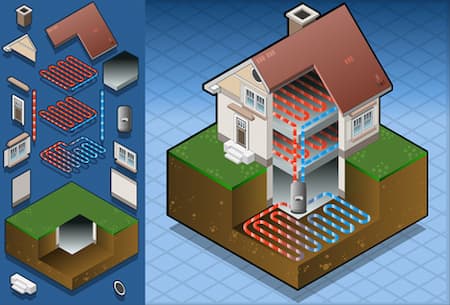Upstate South Carolina Geothermal Heat Pump Basics

As people throughout the world think and take action to preserve the natural environment, most developed countries are taking a fresh look at how they use energy to heat and cool their homes. Furnaces, boilers, and air conditioning units are becoming more efficient. Most, however, rely on fossil fuels. Whether a homeowner looks at a more efficient air conditioner or an air-source heat pump, they will reduce their energy usage somewhat. Whether these systems are operated by oil burners, natural gas, or electricity, they still rely on fossil fuels. The alternative and the most energy-efficient way to heat and cool a home is a Upstate South Carolina geothermal heat pump.
The use of geothermal heat pumps to heat and cool residential homes is a relatively new phenomenon. For many, these systems remain too expensive to consider for their homes. However, an increasing number of homes are installing geothermal units. Because of their amazing energy efficiency, geothermal units are worth understanding and considering. Here are some of the basic facts to help you understand these heating/cooling units.
- Geothermal heat pumps use the heat in the ground to heat or cool water or a liquid coolant. The temperature of the ground is 55°F year round.
- Upstate South Carolina Geothermal heat pumps handle both heating and air conditioning.
- Most geothermal heat pumps also provide hot water, eliminating the need for a separate water heater for the home
- There are three main parts of a Upstate South Carolina geothermal heat pump system: the geothermal heat pump, which moves heat between the building and the fluid in the earth connection; the earth connection, which transfers heat between the earth and the fluid inside it; and a distribution system which delivers heating and cooling to the building.
- Geothermal heat pumps use underground pipes filled with heat transfer fluid or water. This fluid carries heat from inside the house and releases it into the ground in summer to cool your home; in winter, it draws heat from the ground to heat your home.
- The exceptional efficiency of the geothermal heat pump is because the system must only heat or cool the fluid in the pipes by 15 to 20 degrees. Compare this to a conventional air conditioner, which must cool or heat outside air as much as 40-50 degrees in some climates.
- Geothermal heat pumps use 23-44% less energy than the most popular air-source heat pump. The U.S. Environmental Protection Agency has estimated that a Geothermal heat pump can save a typical family 30 – 70% on heating costs and 20 – 50% on cooling costs.
- Water in the pipes can be drawn from a well or heat transfer fluid.
- The cost to install a geothermal heat pump system is usually in the $7,500 – $15,000 range. This seems staggering compared to the $1,500 – $5,000 for installing an air-source heat pump. However, geothermal units pay for themselves quickly at meager operating costs.
- The U.S. Government offers some tax credits and special financing options for purchasing and installing geothermal units.
- Many utility companies offer rebates on the purchase price of a geothermal system. Your Upstate South Carolina plumber or HVAC contractor that specializes in providing geothermal heat pump replacements installations and repairs can offer more information.
- Many state and local governments offer tax credits and rebates on geothermal systems.
